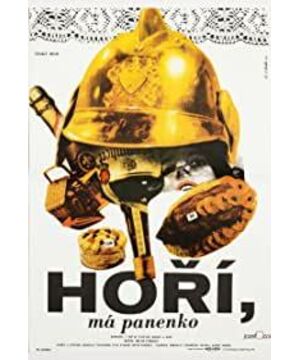For Foreman himself, his films also seem to be in two worlds: the Czech New Wave and Hollywood. It can be said that Foreman is the director who has changed the most from the outside world to Hollywood, and is also the most successful. Masters like Murnau, Hitchcock and others have achieved greatness in Hollywood, yet their style has not changed much. A person as versatile as Polanski is not as handy in Hollywood as Foreman. You must know that Forman has won many awards at the Oscars, and "Flying Over the Cuckoo's Nest" and "Mozart" are all award-winning works. Under such brilliance, Foreman's past in his home country is more like another experience. It was the 1960s, and Foreman was a representative of the Czech New Wave at that time, but he was still blocked everywhere from shooting things. Because it was in a socialist country, the movie was in a weird system. That kind of strange feeling, so far we are so unfamiliar to know nothing about it.
"The Fireman's Ball" is Foreman's last work before leaving the Czech Republic. It is a low-budget, short-length, light comedy. At that time, Foreman was thinking about another script that he didn't know about now. In the middle, he and his friends attended a local firefighter's dance. After that, he was completely attracted by the theme and started to write a new script. The film used non-professional actors, which was the fashion at the time, not only more realistic, but also save money. The filming was also done in 1967, and then it was submitted to the jury according to the rules.
For the judging thing, Foreman has this to say: Usually, the film is shown immediately to the jury, and usually the next day you know if the film will be accepted - they may like it, or they may want you Make some changes to the film, or something. But
We can simulate, you make a movie, and then the great Chairman Mao is very angry when he sees it, and you can imagine how serious the consequences are. Naturally, "The Fireman's Party" was banned from showing, "Permanently and Forever." The funny thing is, nothing else particularly serious happened. Because the film is co-produced with an Italian, if you don't give him the film, you'll have to pay back - $65,000. However, how can socialism have so many dollars to pay back. However, the producer was as unhappy with the film as the GCD folks and wanted his money back. At this point, Foreman faces charges of undermining the socialist economy if things don't work out for the producers. Fortunately, when the domestic power was handed over, Foreman sneaked the film to Paris, where there were many people who liked it. Among them, Truffaut paid for it. The matter was settled, Foreman was not jailed, and he left the Czech Republic shortly thereafter.
Going back to the film itself, it's easy to see why anyone would dislike it so much.
Regardless of the inside and outside of the film, everything related to this movie adds up to a pretty cold joke. Like some things that happen in life, it sounds unrealistic, but it is true. Simply looking at it, the feeling of happiness is greater than some misunderstandings.
View more about The Firemen's Ball reviews








